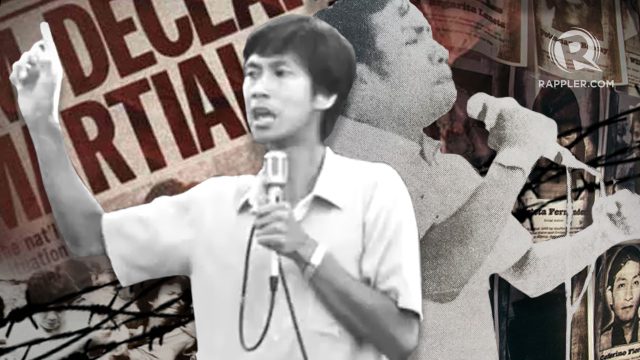SUMMARY
This is AI generated summarization, which may have errors. For context, always refer to the full article.
 The elections and the candidacy of Ferdinand Marcos Jr have once again brought up the issue of his father’s dictatorship and the abuses of martial law. It seems the country can never escape the shadow of its past – and rightly so.
The elections and the candidacy of Ferdinand Marcos Jr have once again brought up the issue of his father’s dictatorship and the abuses of martial law. It seems the country can never escape the shadow of its past – and rightly so.
Many Filipinos voted for Marcos Jr and justified it as an act of moving on. The country should shake off the dust of 1972, they argued. Filipinos need to heal; and besides, the sin of the father is not the sin of the son, they said.
Their voices thundered across social media, but others engaged them, sharing stories of the horrors of martial law, and reminding everyone of its human cost. (READ: Martial law? Never again!)
In an election where “healing” and “unity” have been buzzwords, why does it seem like the country cannot move on?
When Marcos Sr declared martial law and clamped down on the opposition, scores of Filipinos rose against him, and suffered in the process. Many of them lived to tell the tale; many others did not. (WATCH: ‘Lucky day’: Surviving torture during martial law)
Where did all the young people go?
Many victims were young – some only as old as the recent batch of graduates when they died – and bright-eyed with idealism and the desire to serve. (READ: #NeverAgain: Martial Law stories young people need to hear)
They were, like Liliosa Hilao, writers who put into words their opposition to the regime. Liliosa wrote “Democracy is dead“ in her diary when Marcos Sr declared martial law, and wore black to match her mourning.
In 1973, members of the Constabulary Anti-Narcotics Unit barged into her family’s home to look for her brother. Liliosa demanded a search warrant, so officers took her away and beat her. She later told her brother-in-law she was tortured. The day after her brother-in-law‘s visit, her sister Alice went to Camp Crame Hospital to pick up her dead body, which was riddled with marks of abuse.
They were community organizers, like Edward de la Fuente, who worked among the poor as a “a skilled negotiator and troubleshooter.” Before he left his family to serve in the villages of Panay, he spent 14 months in prison for writing slogans in protest of martial law.
He spent 10 years working for the poor. In 1984, the military killed him. They said it was during an encounter; the autopsy indicated torture.
Edgar “Edjop” Jopson and Leandro “Lean” Alejandro were two of their generation’s brightest stars.
One of Edjop‘s most famous acts is his confrontation with Marcos Sr. He was able to get a meeting with the president to discuss Marcos Sr’s plan to change the constitution. He insisted that Marcos Sr sign a document pledging not to run for a 3rd term. Marcos refused, saying he would not agree to a demand from a “grocer‘s son.” Edjop replied, “Honest grocer naman.” (READ: Edjop, Imelda Marcos, and the fear of forgetting)

The military captured Edjop in a raid in 1982. Refusing to cooperate during the interrogations, he was executed the day after.
Lean, meanwhile, actively campaigned against martial law while in the University of the Philippines. He joined and led protests against the regime, and helped establish the Bagong Alyansang Makabayan (Bayan). He later became Bayan‘s secretary-general.
In 1987, Lean was assassinated. He was on his way to Bayan’s offices in Cubao when his vehicle was ambushed. His murder has yet to be solved.
There were many others like them: Archimedes Trajano, who dared question Imee Marcos’s being National Chairman of the Kabataang Barangay; Enrique Voltaire Garcia II, the former editor in chief of the Philippine Collegian; Lorena Barros, the first chairperson of the Malayang Kilusan ng Bagong Kababaihan. They all died for holding views dangerous to the regime.
Martial law and the death of the future
When the Marcos regime killed that crop of young leaders, they took with them would-be congressmen, senators, and perhaps, presidents. Martial law stole more than the country‘s financial wealth – the Philippines was also robbed of a generation of bright minds.
Edjop was 34 years old at the time of his death; he would have turned 68 this year. Lean died at 27; he would have been nearing his 56th birthday today.
When the youth criticize today’s quality of governance, they should look to those dark years and see how they lost the chance to elect those bright minds.
But all is not lost, and that is cause for hope.
The youth beyond 1986, 2016
The 2016 polls have been called “the social media elections” because of the numerous campaign tools available. Maybe it should also be called “the youth‘s elections.“
The youth are the largest segment of the population, making up more than 40% of the electorate. They have also been vocal about issues concerning them. Their sheer number and advocacies, coupled with their Internet skills, have made them more influential than they ever have been.
Young people were called to serve their country in 1972 to fight oppression, and again in 1986 to overthrow the regime that started it. In 2016, they had to choose the country‘s future direction. The people, the youth included, have spoken, but civic participation has never ended with just voting.
Now, more than ever, the youth have the responsibility to be the leaders we lost in the dark years. They should be the Liliosas, Edwards, Edjops, and Leans.
But they can only do that by remembering those who came before them, and understanding that they are the successors of the people who died, the people who would have wanted them to continue the good fight.
The youth’s time will come, and when it does, we could be on our way to healing. I would like to think that when that happens, Liliosa, Edward, Edjop, Lean, and all the martial law victims will look upon us with pride. – Rappler.com
Bea Orante is a freelance writer and history buff.
Add a comment
How does this make you feel?
There are no comments yet. Add your comment to start the conversation.